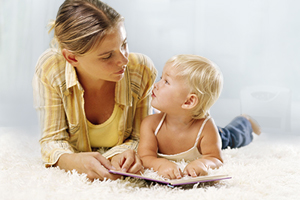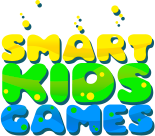Helping your toddler to talk.

Before babies learn to speak actual language they coo, babble and play with sounds. This baby talk sounds similar all over the world. But when will parents be lucky to hear their baby's first real words? Usually babies utter their first conscious words by their first birthday making their parent cry with joy or dancing jig, but as many aspects of kids’ development, talking is highly individual. Critical milestones in the process of a baby learning to talk happen during his first three years of life, when the baby's brain is actively developing. But at average in the process of learning how to speak the baby goes through several stages:
- 2-3 months – the baby listens to the parents’ voices, notices other sounds such as music and tries to respond by means of babbling and cooing;
- 5-7 months – babbling and cooing are more clear;
- 7-9 months – uttering first short words with repeating syllables like ma-ma or ba-ba which are actually random syllables without the real meaning or comprehension;
- after 9 months the baby starts putting sense into the uttered words;
- and by the first year kids usually can say 2 – 10 mono- and disyllabic words which are more sound imitation (for example, “ma-ma” or “ma”, “da-da”, “beep-beep”). Then the vocabulary grows in huge rate and by the age of three your dear little one turns into a cute “chatter-box”.
Many parents tend to initiate their kids’ talking as soon as the kid starts understanding more or less what’s going on around him. So, how parents can help their little ones start talking fast and correctly? Here are the tips psychologists recommend to practice daily:
- Since the baby was born talk to him as much as possible. Surely, he won’t understand what you’re saying but he comprehends the intonation. More than that he passively accumulates his vocabulary. Talk while you’re making dinner, what you’re cooking and who’s going to eat. Walking outside with the baby describe the weather, what you see or how you feel. Imagine that you are a TV commentator - comment on everything you’re doing!
- Babies start talking by imitating the adults. It’s important to talk to the child so that he could see you, your facial expression and articulation. And don’t forget about making an eye-contact with your dear little one.
- Sounds are the building elements for verbal communication and sound imitation plays the crucial role in teaching children to talk. Kids love sounds so much because in first 12 month it’s much easier for them to imitate sounds, rather than words. During play and communication use sounds – it’s an essential base for future word learning. For instance, don’t push a car but push it and say “vroom” or showing pictures to the kid with animals produce sounds they make (cow – “moo”, dog - “ruff-ruff”, duck - “quack-quack”, etc.)
- Read and reread baby books to your precious little one. Use books that are full of illustrations, contain songs and suit his age. While reading, ask your child to find on the pictures the characters you’re reading about, describe for him these pictures. Later retell his favorite stories but with several changes and let him correct you. This not only widens vocabulary but also develops attention and memory.
- Make him talk. When your little one points to the objects with his finger, pretend that you don’t understand what he wants. When your kid points to the shelf with his toys asking you to give, for example, his favorite teddy bear, don’t rush immediately to the shelf but start offering him other toys “Do you want this car? No? Than may be that doll? Again no? I don’t understand what toy you pointing at.” Then give the toy he wanted: “This is the teddy bear”. One day your child will get tired of your “misunderstanding” and instead of pointing will pronounce the word.
- Explain the meaning of new words using the vocabulary he already knows. Don’t rush to extend his vocabulary too fast. Let the child master those words that he has already learnt.
- Involve your child into a dialogue. Ask him questions: what is your name? What’s your mummy’s and daddy’s name? Do you want this apple or that one? Listen to your child’s answer even though you won’t understand much at the beginning. Praise also “why” questions. Sometimes it’s hard to answer this endless stream of questions but when you answer the question or explain something you help your little one widen his vocabulary.
Parents are the best people to follow their kids’ speech development. If you have concerns about your child’s language development, be sure to consult with your pediatrician and check your baby’s hearing since hearing problems affect the child’s speech development. If hearing is fine, but the child doesn’t talk, the doctor may recommend you to visit a speech therapist, as many language delays diagnosed at the early stage can be easily corrected.










